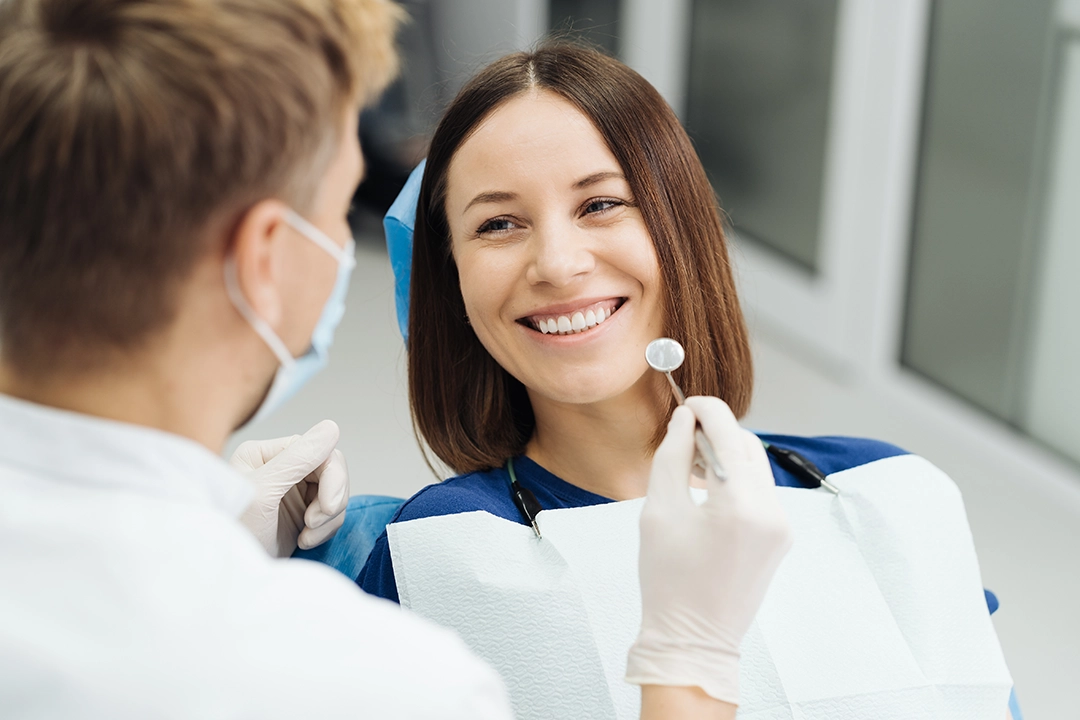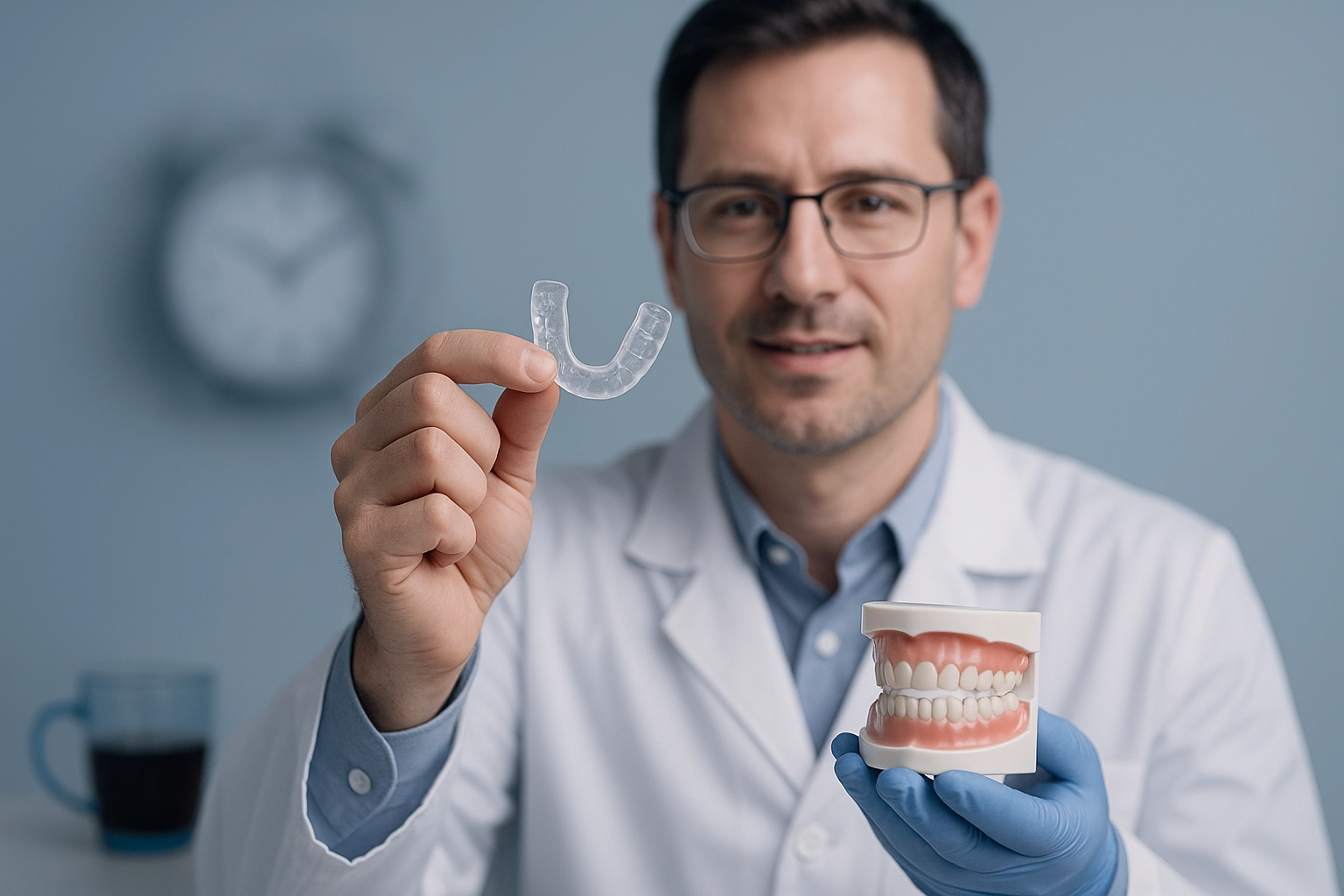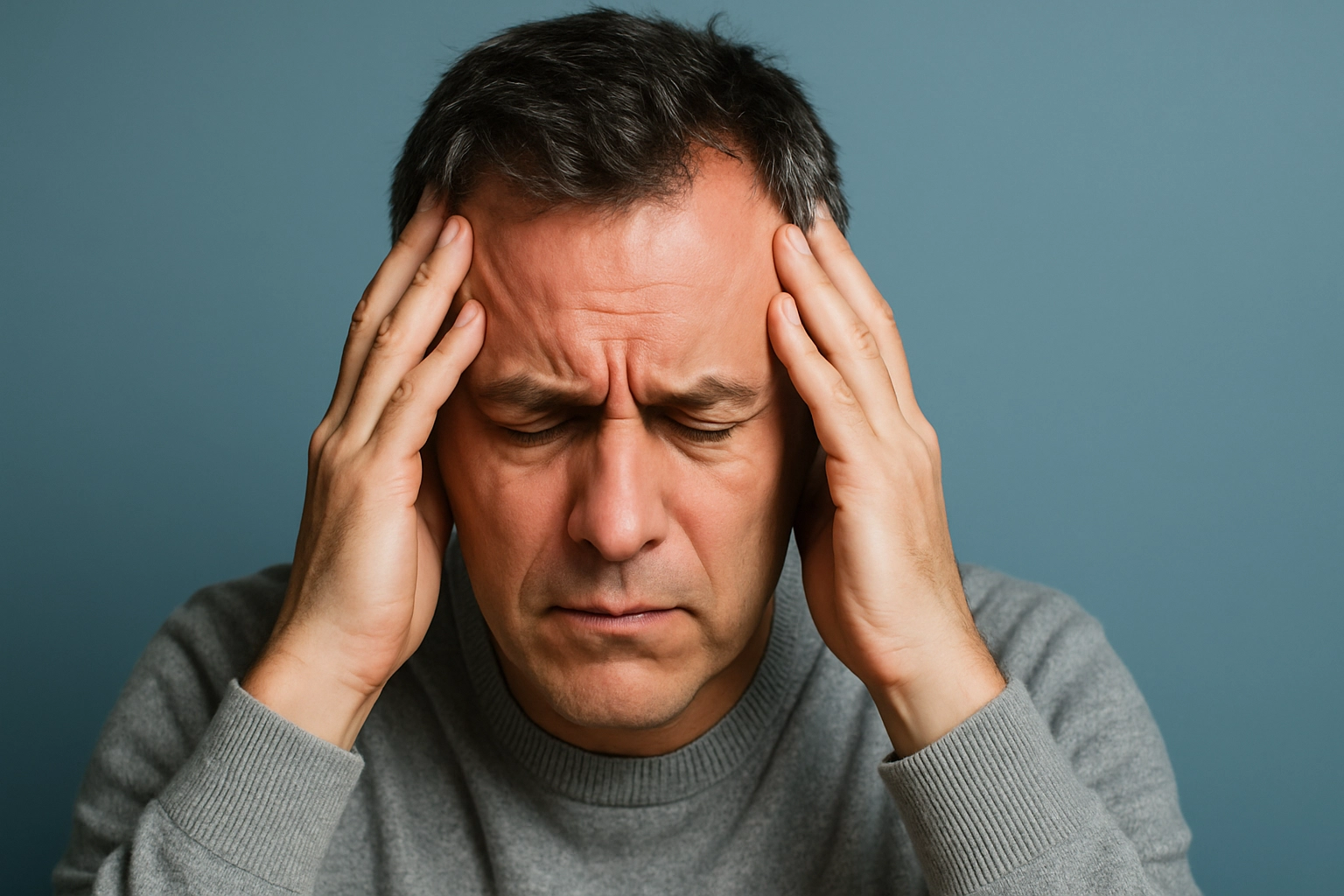
Teeth Grinding: 10 Warning Signs You Shouldn’t Ignore
Teeth grinding, medically termed bruxism, is a condition characterized by the involuntary clenching or grinding of teeth. Often occurring during sleep, many individuals remain unaware of this habit until noticeable symptoms or dental complications arise. While occasional grinding may not pose significant harm, persistent bruxism can lead to severe dental issues, jaw disorders, and disrupted sleep patterns.
At Brighton Implant Clinic, we emphasize the importance of early detection and intervention. Understanding the signs and causes of bruxism is crucial in preventing long-term damage and ensuring optimal oral health.
Understanding Bruxism - What Is Teeth Grinding?
Bruxism involves the repetitive clenching or grinding of teeth, which can occur during wakefulness (awake bruxism) or sleep (sleep bruxism). While it might seem benign, chronic bruxism can lead to significant dental wear, jaw disorders, and other health complications.
Common causes include:
- Stress and Anxiety: Emotional stress is a leading contributor to bruxism.
- Sleep Disorders: Conditions like sleep apnea have been linked to increased bruxism episodes.
- Medications: Certain antidepressants and stimulants can induce teeth grinding.
- Lifestyle Factors: Excessive caffeine or alcohol intake, smoking, and recreational drug use.
Recognizing these factors is the first step toward effective management and treatment.
Types of Bruxism
Bruxism manifests in two primary forms:
- Awake Bruxism: Typically associated with stress or concentration, individuals may unconsciously clench their teeth during the day.
- Sleep Bruxism: Occurs during sleep and is often more severe due to the lack of conscious control. It is frequently linked to other sleep-related disorders.
Understanding the type of bruxism is essential for tailoring appropriate treatment strategies.
Recognizing the Warning Signs - 10 Signs

Identifying the symptoms of bruxism early can prevent extensive dental damage and other complications.
1. Audible Grinding Sounds
One of the most apparent signs is a grinding noise during sleep, often noticed by a sleep partner. This sound results from the forceful rubbing of teeth surfaces and indicates significant jaw activity during rest.
2. Morning Headaches or Facial Pain
Waking up with headaches, especially in the temples, or experiencing facial muscle soreness can be indicative of nocturnal teeth grinding. The constant tension exerted on facial muscles during sleep leads to these discomforts.
3. Jaw Discomfort or TMJ Disorders
Persistent jaw pain, clicking sounds when opening or closing the mouth, and limited jaw movement suggest temporomandibular joint (TMJ) involvement. Bruxism exerts excessive pressure on the TMJ, leading to inflammation and dysfunction.
4. Tooth Sensitivity or Pain
Enamel erosion from grinding exposes the dentin layer, making teeth more sensitive to temperature changes and certain foods. This sensitivity often manifests as sharp pain when consuming hot or cold items.
5. Worn, Chipped, or Flattened Teeth
Regular grinding wears down the tooth surfaces, leading to flattened or chipped teeth. Over time, this can alter the bite and necessitate restorative dental procedures.
6. Damaged Dental Work
Bruxism can compromise dental restorations like crowns, fillings, or bridges. The excessive force may cause these structures to crack or dislodge, requiring frequent repairs or replacements.
7. Earaches or Tinnitus
The proximity of the jaw joint to the ear means that bruxism can lead to ear-related symptoms, including earaches or a ringing sensation known as tinnitus.
8. Sleep Disturbances
Frequent awakenings, restless sleep, or feeling unrefreshed upon waking can be linked to sleep bruxism. The involuntary muscle activity disrupts normal sleep patterns, leading to fatigue.
9. Tooth Mobility or Looseness
Continuous grinding can loosen teeth by damaging the supporting structures. This mobility increases the risk of tooth loss and may necessitate interventions like dental implants.
10. Changes in Facial Appearance
Overdeveloped jaw muscles from constant clenching can alter facial aesthetics, leading to a more square jawline. Such changes can impact self-esteem and may require cosmetic treatments.
Teeth Grinding Causes and Risk Factors

Understanding the underlying causes of bruxism is vital for effective treatment.
Psychological Factors
- Stress and Anxiety: Emotional distress is a primary trigger for bruxism.
- Personality Traits: Individuals with aggressive, competitive, or hyperactive personalities are more prone to teeth grinding.
Physical and Lifestyle Factors
- Sleep Disorders: Conditions like obstructive sleep apnea are closely linked to bruxism.
- Medications: Certain antidepressants, especially selective serotonin reuptake inhibitors (SSRIs), have been associated with increased bruxism episodes.
- Substance Use: High consumption of caffeine, alcohol, or recreational drugs can exacerbate teeth grinding.
Potential Complications of Teeth Grinding
Bruxism, if left unmanaged, can lead to a range of complications affecting dental health, jaw function, and overall well-being.
Dental Damage
Chronic teeth grinding exerts excessive force on the teeth, leading to:
- Tooth Wear: Enamel erosion exposes the underlying dentin, increasing sensitivity and susceptibility to decay.
- Cracks and Fractures: The constant pressure can cause teeth to crack or fracture, potentially necessitating restorative procedures.
- Damage to Dental Work: Existing restorations like crowns, bridges, or implants may become loose or damaged due to the excessive forces.
Temporomandibular Joint (TMJ) Disorders
Bruxism is a significant risk factor for TMJ disorders, which can manifest as:
- Jaw Pain: Persistent pain or discomfort in the jaw muscles.
- Clicking or Popping Sounds: Audible noises when opening or closing the mouth.
- Limited Jaw Movement: Difficulty in opening or closing the mouth fully.
These symptoms can significantly impact daily activities like eating and speaking.
Sleep Disturbances
Bruxism, especially during sleep, can lead to:
- Interrupted Sleep: Frequent awakenings or arousals during the night.
- Daytime Fatigue: Feeling unrefreshed upon waking, leading to decreased alertness and productivity.
- Sleep Apnea Association: Bruxism is often linked with sleep disorders like obstructive sleep apnea, compounding sleep-related issues.
Facial Pain and Headaches
The excessive muscle activity involved in grinding can cause:
- Tension Headaches: Often starting in the temples and radiating to other areas.
- Facial Muscle Soreness: Particularly in the jaw, neck, and shoulders.
These symptoms can affect concentration and overall quality of life.
Altered Facial Appearance
Over time, bruxism can lead to hypertrophy of the masseter muscles, resulting in a more square jawline. This change in facial aesthetics can be distressing for some individuals.
Recognizing these potential complications underscores the importance of early diagnosis and intervention in managing bruxism effectively.
Teeth Grinding Diagnosis and Evaluation

Early and accurate diagnosis of bruxism is crucial to prevent long-term dental and jaw complications. Dentists play a pivotal role in identifying signs of teeth grinding through comprehensive examinations and patient history assessments.
Clinical Examination
During routine dental check-ups, dentists look for telltale signs of bruxism, such as:
- Worn tooth enamel
- Flattened, fractured, or chipped teeth
- Tooth sensitivity
- Enlarged jaw muscles
- Damage to the inside of the cheeks
These indicators help in assessing the severity and progression of the condition.
Patient History and Symptom Assessment
Understanding a patient's lifestyle, stress levels, sleep patterns, and any reported symptoms like jaw pain or morning headaches provides valuable context. This information aids in distinguishing between awake and sleep bruxism and identifying potential triggers.
Advanced Diagnostic Tools
In certain cases, especially when sleep bruxism is suspected, a sleep study (polysomnography) may be recommended. This test monitors various physiological parameters during sleep, helping to detect bruxism episodes and associated sleep disorders like obstructive sleep apnea.
Teeth Grinding Treatment Options

Addressing bruxism involves a multifaceted approach tailored to the individual's specific needs and the underlying causes of the condition.
Dental Interventions
- Custom-Fitted Mouthguards: These are designed to be worn during sleep to protect teeth from grinding damage. They also help in reducing jaw muscle activity.
- Dental Corrections: If misaligned teeth or bite issues contribute to bruxism, orthodontic treatments or restorative procedures may be necessary to correct the alignment and reduce grinding tendencies.
Behavioral and Lifestyle Modifications
- Stress Management: Implementing relaxation techniques such as meditation, yoga, or cognitive-behavioral therapy can alleviate stress-induced bruxism.
- Sleep Hygiene: Establishing a regular sleep schedule and creating a restful sleeping environment can mitigate sleep bruxism.
- Avoiding Stimulants: Reducing the intake of caffeine and alcohol, especially before bedtime, can decrease the likelihood of teeth grinding.
Medical Treatments
- Medications: In some cases, muscle relaxants or medications to manage anxiety and stress may be prescribed.
- Botox Injections: Botulinum toxin injections can help weaken the jaw muscles responsible for grinding, providing relief in severe cases.
Preventive Measures
Prevention is key in managing bruxism and avoiding its detrimental effects on oral health.
- Regular Dental Check-Ups: Routine visits allow for early detection and intervention, preventing further damage.
- Awareness and Education: Being mindful of teeth clenching during the day and adopting relaxation techniques can reduce awake bruxism.
- Protective Devices: Using mouthguards during high-stress periods or when engaging in activities that may trigger grinding can safeguard teeth.
Special Considerations for Children
Bruxism is not uncommon in children, often occurring during sleep. While many outgrow the habit, it's essential to monitor and address it appropriately.
Factors such as misaligned teeth, stress, and certain medical conditions can contribute to bruxism in children.
Regular dental check-ups, stress management, and, in some cases, the use of mouthguards can help manage the condition.
When to Seek Professional Help
It's imperative to consult a dental professional if you experience:
- Persistent jaw pain or discomfort
- Frequent headaches or earaches
- Noticeable tooth wear or damage
- Disrupted sleep patterns
Early intervention can prevent more severe complications and improve overall quality of life.
How Brighton Implant Clinic Can Help
At Brighton Implant Clinic, we specialize in diagnosing and treating bruxism with a comprehensive approach. Our services include:
- Custom Mouthguards: Tailored to fit your mouth, providing optimal protection against grinding.
- Restorative Dentistry: Repairing damage caused by bruxism to restore function and aesthetics.
- Stress Management Referrals: Connecting patients with professionals to address underlying stress or anxiety contributing to bruxism.
Our experienced team is dedicated to providing personalized care to help you achieve optimal oral health.
Frequently Asked Questions (FAQs)
What are the long-term effects of untreated bruxism?
If left unaddressed, bruxism can lead to significant dental issues, including tooth fractures, enamel erosion, and temporomandibular joint disorders. It may also cause chronic headaches and facial pain.
Can bruxism be completely cured?
While there is no definitive cure for bruxism, especially sleep-related bruxism, various treatments can effectively manage and reduce symptoms. Combining dental interventions with behavioral therapies often yields the best results.
Is it necessary to wear a mouthguard every night?
For individuals with sleep bruxism, wearing a custom-fitted mouthguard nightly is recommended to protect teeth from grinding damage and alleviate jaw strain.
Are children likely to outgrow bruxism?
Most children naturally outgrow bruxism as they transition from baby teeth to permanent teeth. However, if teeth grinding persists beyond the age of six, or if it leads to symptoms like jaw pain, headaches, or noticeable tooth wear, it's advisable to consult a dental professional. Early intervention can prevent potential complications and ensure your child's oral health remains optimal.
Conclusion: Protecting Your Smile from the Effects of Bruxism
Teeth grinding, or bruxism, is more than just a nighttime nuisance; it's a condition that can have significant implications for your dental health and overall well-being. Recognizing the signs early - such as jaw pain, worn teeth, or disrupted sleep—is crucial in preventing long-term damage. With a combination of professional dental care, lifestyle modifications, and, when necessary, therapeutic interventions, bruxism can be effectively managed.
At Brighton Implant Clinic, we are committed to providing comprehensive care tailored to your individual needs. Whether you're experiencing symptoms of bruxism or seeking preventive advice, our team of experienced dental professionals is here to help you achieve and maintain optimal oral health. Don't let teeth grinding compromise your smile - schedule a consultation with us today.










